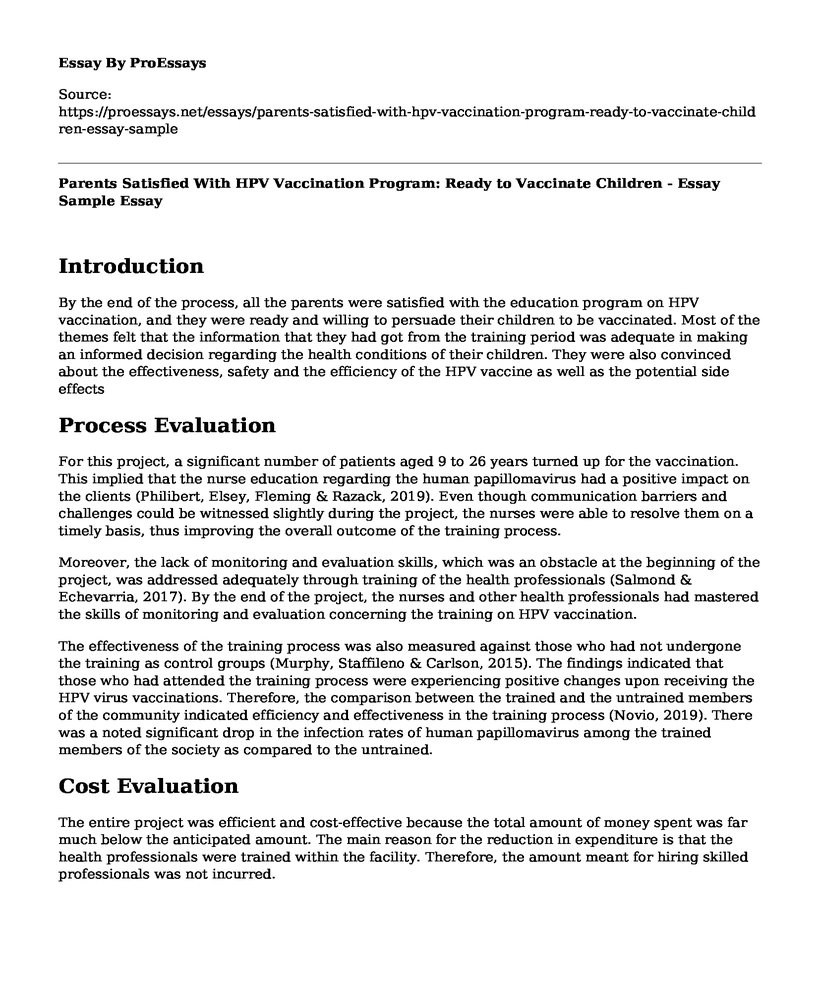Introduction
By the end of the process, all the parents were satisfied with the education program on HPV vaccination, and they were ready and willing to persuade their children to be vaccinated. Most of the themes felt that the information that they had got from the training period was adequate in making an informed decision regarding the health conditions of their children. They were also convinced about the effectiveness, safety and the efficiency of the HPV vaccine as well as the potential side effects
Process Evaluation
For this project, a significant number of patients aged 9 to 26 years turned up for the vaccination. This implied that the nurse education regarding the human papillomavirus had a positive impact on the clients (Philibert, Elsey, Fleming & Razack, 2019). Even though communication barriers and challenges could be witnessed slightly during the project, the nurses were able to resolve them on a timely basis, thus improving the overall outcome of the training process.
Moreover, the lack of monitoring and evaluation skills, which was an obstacle at the beginning of the project, was addressed adequately through training of the health professionals (Salmond & Echevarria, 2017). By the end of the project, the nurses and other health professionals had mastered the skills of monitoring and evaluation concerning the training on HPV vaccination.
The effectiveness of the training process was also measured against those who had not undergone the training as control groups (Murphy, Staffileno & Carlson, 2015). The findings indicated that those who had attended the training process were experiencing positive changes upon receiving the HPV virus vaccinations. Therefore, the comparison between the trained and the untrained members of the community indicated efficiency and effectiveness in the training process (Novio, 2019). There was a noted significant drop in the infection rates of human papillomavirus among the trained members of the society as compared to the untrained.
Cost Evaluation
The entire project was efficient and cost-effective because the total amount of money spent was far much below the anticipated amount. The main reason for the reduction in expenditure is that the health professionals were trained within the facility. Therefore, the amount meant for hiring skilled professionals was not incurred.
Summary and Conclusions
In conclusion, human papillomavirus vaccination is an effective and efficient method of reducing the multiple kinds of cancers (Murphy, Staffileno & Carlson, 2015). However, the major challenge that as always hindered the implementation of the HPV vaccination program in the past is a lack of knowledge and information regarding the effectiveness of embracing the vaccination. The project was deemed successful since positive feedbacks for the vaccinated individuals accompanied it. The monitoring phase of the program revealed that there was a significant change for those who had received the training as compared to those who had not attended the training. This proved the efficiency and effectiveness of the entire project.
Significance of the Project to the Nursing Profession
Engaging in a training exercise and convincing many people to participate in vaccination against human papillomavirus is not a mean achievement in the nursing profession. From the project, nurses and other healthcare professionals are convinced that community mobilization and training are significant in ensuring that essential health care services reach a majority of the people within the community. The project could be replicated in other areas within the healthcare sector to make a significant change in the healthcare sector.
Recommendation for Future Research
Future research should seek the engagement of other professionals, such as social workers, to assist in the community mobilization process. There is also a need to device various mechanisms for reaching a wide range of participant to be involved in the process (Philibert, Elsey, Fleming & Razack, 2019)
References
Murphy, M. P., Staffileno, B. A., & Carlson, E. (2015). Collaboration among DNP-and PhD-prepared nurses: Opportunity to drive positive change. Journal of Professional Nursing, 31(5), 388-394.
Philibert, I., Elsey, E., Fleming, S., & Razack, S. (2019). Learning and professional acculturation through work: Examining the clinical learning environment through the socio-cultural lens. Medical teacher, 1-5.
Salmond, S. W., & Echevarria, M. (2017). Healthcare transformation and changing roles for nursing. Orthopedic nursing, 36(1), 12.
Villanueva, S., Mosteiro-Miguens, D. G., Dominguez-Martis, E. M., Lopez-Ares, D., & Novio, S. (2019). Knowledge, Attitudes, and Intentions towards Human Papillomavirus Vaccination among Nursing Students in Spain. International journal of environmental research and public health, 16(22), 4507.
Cite this page
Parents Satisfied With HPV Vaccination Program: Ready to Vaccinate Children - Essay Sample. (2023, Apr 04). Retrieved from https://proessays.net/essays/parents-satisfied-with-hpv-vaccination-program-ready-to-vaccinate-children-essay-sample
If you are the original author of this essay and no longer wish to have it published on the ProEssays website, please click below to request its removal:
- Concept-Based Nursing Curriculum Paper Example
- Research Paper on Regulating Nurses & Midwives
- CDC Childhood Injury Report: Unintentional Accidents as Leading Causes of Child Mortality
- Essay Sample on Nurses Vital for Software Dev't: Health IT Failure High, Complex Patient Care Needs
- Holistic Care of Dementia Patients: Nursing Staff's Competencies and Challenges - Research Paper
- Essay Example on Ageing Mobility: Key to Global Age-Friendly Cities Project
- Generalist Practice and Voting - Essay Example







